Torn by the War—Tzu Chi Helps Displaced Ukrainians
By Yeh Tzu-hao (葉子豪)
Edited and translated by Wu Hsiao-ting (吳曉婷)
Photos by Zhang Shu-er (張淑兒)
Torn by the War—Tzu Chi Helps Displaced Ukrainians
By Yeh Tzu-hao (葉子豪)
Edited and translated by Wu Hsiao-ting (吳曉婷)
Photos by Zhang Shu-er (張淑兒)
Russia and Ukraine have long been at loggerheads over a range of issues. When Russia invaded Ukraine in February this year, it initiated the largest war in Europe since World War II. Though Ukraine has impressed the world with its resolute defense, its cities have seen heartrending, massive destruction. Parts of the country are now unrecognizable. People have fled in desperation from their homes, seeking safety and survival.
Millions of Ukrainians have escaped to Poland, Slovakia, Hungary, Romania, and other countries. According to statistics from the United Nations, more than 4.8 million people had left Ukraine by April 18, 2022. Among those, over 2.7 million had taken shelter in Poland. That's also where Tzu Chi launched its aid to Ukrainians displaced by the war.
Shopping cards
Tim Lu (呂宗翰) is a Tzu Chi staffer at the foundation's headquarters in Hualien, eastern Taiwan. He explained that the foundation has no branch office nor certified volunteers in Poland, so Tzu Chi had mobilized its volunteers in Great Britain, Germany, and France after the war broke out. Volunteers in those countries sent the foundation's entire inventory of blankets, scarves, and other supplies stored in London, Munich, and Paris to Hamburg, Germany. From Hamburg, the supplies were shipped into Poland to be distributed to refugees. The foundation conducted its first distributions there in March.
Tzu Chi's first distribution took place on March 5 in Poznań, west-central Poland. It was organized by Zhang Shu-er (張淑兒), a Taiwanese who once worked for Tzu Chi's Da Ai TV in Taiwan, her Polish husband, Łukasz Baranowski, and another Polish person who could speak Chinese. They managed to complete four distributions by the end of March. "They also brought food and other necessities to the refugees sheltering at the House of Hope, a Catholic facility which used to take in people trying to quit drugs," said Lu. "The Catholic nuns at the House of Hope have given their rooms to refugees and moved into the basement. It's very moving."
The foundation eventually decided to include shopping cards in its distribution items. "Refugees fled to Poland laden with their luggage," Tim Lu explained. "If we distribute supplies to them weighing ten or 20 kilograms [22 to 44 pounds], the extra weight makes it hard for them to move around. After talking to our helpers in Poland, we decided to distribute shopping cards in addition to sleeping bags and blankets." The shopping cards would allow refugees to make purchases at designated stores.
However, preparing the shopping cards hit a snag: a severe local shortage of plastic made it impossible to produce the shopping cards required by Tzu Chi. Volunteers thus negotiated with the chain retailer Tzu Chi is working with to provide 15,000 shopping cards of their own for Tzu Chi to use. Fortunately, the retailer had enough cards in their inventory to fill the request. Tzu Chi logos were affixed to the cards before they were distributed.
Tzu Chi's aid reached the city of Szczecin, in northwestern Poland, with the help of a Polish woman named Malgorzata Baryliszyn, whom Tzu Chi volunteers in Great Britain had introduced to the foundation. She visited a refugee shelter at the University of Szczecin and donated 1,260 sleeping bags and other items on behalf of Tzu Chi to the refugees there. Plans to provide more supplies, enough for 3,000 people, are also in the works.
Tzu Chi is also working to bring refugee relief to Warsaw, Poland's capital. Some Taiwanese people in Warsaw, working in conjunction with other organizations, are contacting and visiting various shelters to assess the needs of Ukrainian refugees there and plan for future Tzu Chi work.
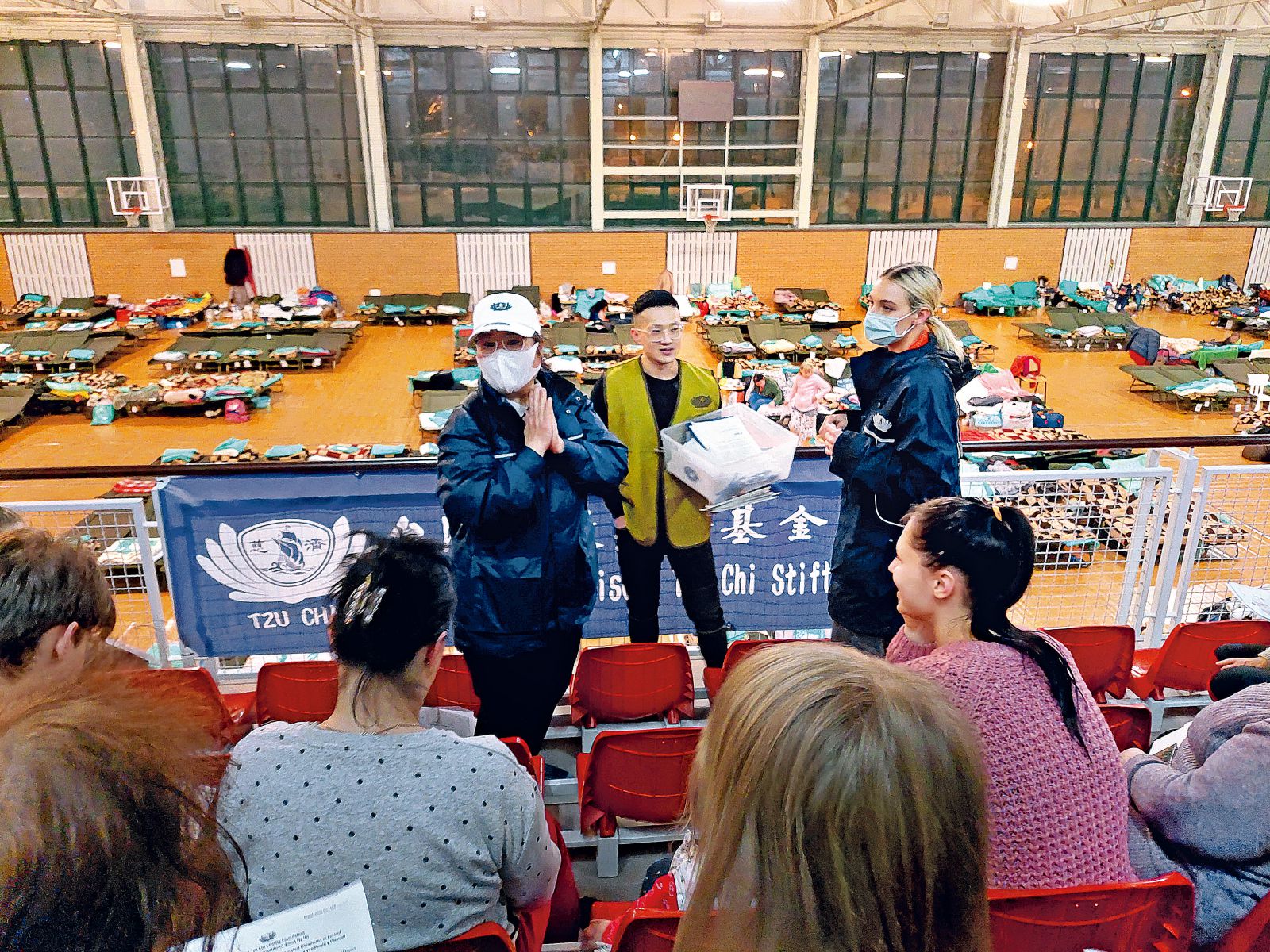
Tzu Chi volunteers distribute shopping cards and blankets to Ukrainian refugees at a Red Cross shelter in Lublin, eastern Poland. Refugees can use the shopping cards to make purchases at designated stores.
Empathizing with their pain
Joey Chen, a graduate of Tzu Chi University in Taiwan, was enlisted to help organize the foundation's aid efforts in Lublin, eastern Poland. He worked with the city government, the local Red Cross, and Caritas, to make arrangements to launch distributions in the city. Volunteers conducted four distributions in Lublin on April 2 and 3. The first three were held at the Medical University of Lublin (MUL) and a Red Cross shelter. The fourth was held in cooperation with Caritas.
To help organize the distributions, Tzu Chi volunteers Susan Chen (陳樹微), from Germany, and Hady Souki, from the Netherlands, arrived in Lublin after driving 12 hours from Munich. They worked alongside Joey Chen and students and teachers from MUL, who had joined Tzu Chi's relief efforts in response to Joey Chen's call for help.
Susan Chen has many years of experience conducting international relief work for Tzu Chi. She has visited refugee camps in Serbia many times to extend care and distribute aid to refugees there. She said that the Russia-Ukraine war had happened so suddenly that the non-governmental organizations in Poland were unprepared for the large influx of refugees. It didn't help that many of the organizations had no experience in handling large numbers of refugees. When Tzu Chi's partner organizations learned that the foundation was distributing shopping cards, they were doubtful it could be successfully organized. One challenge Tzu Chi needed to overcome, for example, was the compilation of recipient rosters.
Despite the challenges ahead of them, Susan Chen and the others were undaunted. They talked with city government personnel, visited refugee shelters, enlisted volunteers to help, and organized the data they had collected. They were so busy they barely had time to sleep. Chen was impressed by the enthusiasm of the MUL students and teachers who had volunteered to help. She was especially moved by the students from Ukraine.
"I told them Tzu Chi would pay them for their work, in a form of work relief," Chen said. "But the students wouldn't hear of it. They said to us, 'You've come all the way here to help our fellow countrymen, how could we receive compensation from you?' But, considering they were students without jobs yet, and that some had driven a long way to participate in our work, I decided in the end to go ahead and pay them."
All the challenges were eventually overcome with everyone working together, and Tzu Chi's distributions in Lublin began. When the English version of the Tzu Chi song "Prayer" was played at the first distribution, some of the attending Ukrainians prayed, some burst into tears, while children, too young to grasp the significance of what was happening in their country, continued to play off to one side.
Susan Chen and student helpers from Taiwan greeted the Ukrainians on-site with some simple Ukrainian phrases they had learned for the occasion. The Ukrainians were very grateful and warm, treating them as if they were their own friends or compatriots. Some Ukrainians asked to take pictures with them. They even invited Chen to where they were staying and poured out their hearts to her—even though Chen didn't understand Ukrainian.
"They were mostly women with children," said Chen, "although there were some elderly men too. Their emotional needs required a lot of care."
At the same time volunteers in Europe worked on the front lines in Poland to provide help to Ukrainians displaced by the war, many Tzu Chi volunteers were also doing their bit to help, more than 8,000 kilometers (4,970 miles) away in Taiwan.
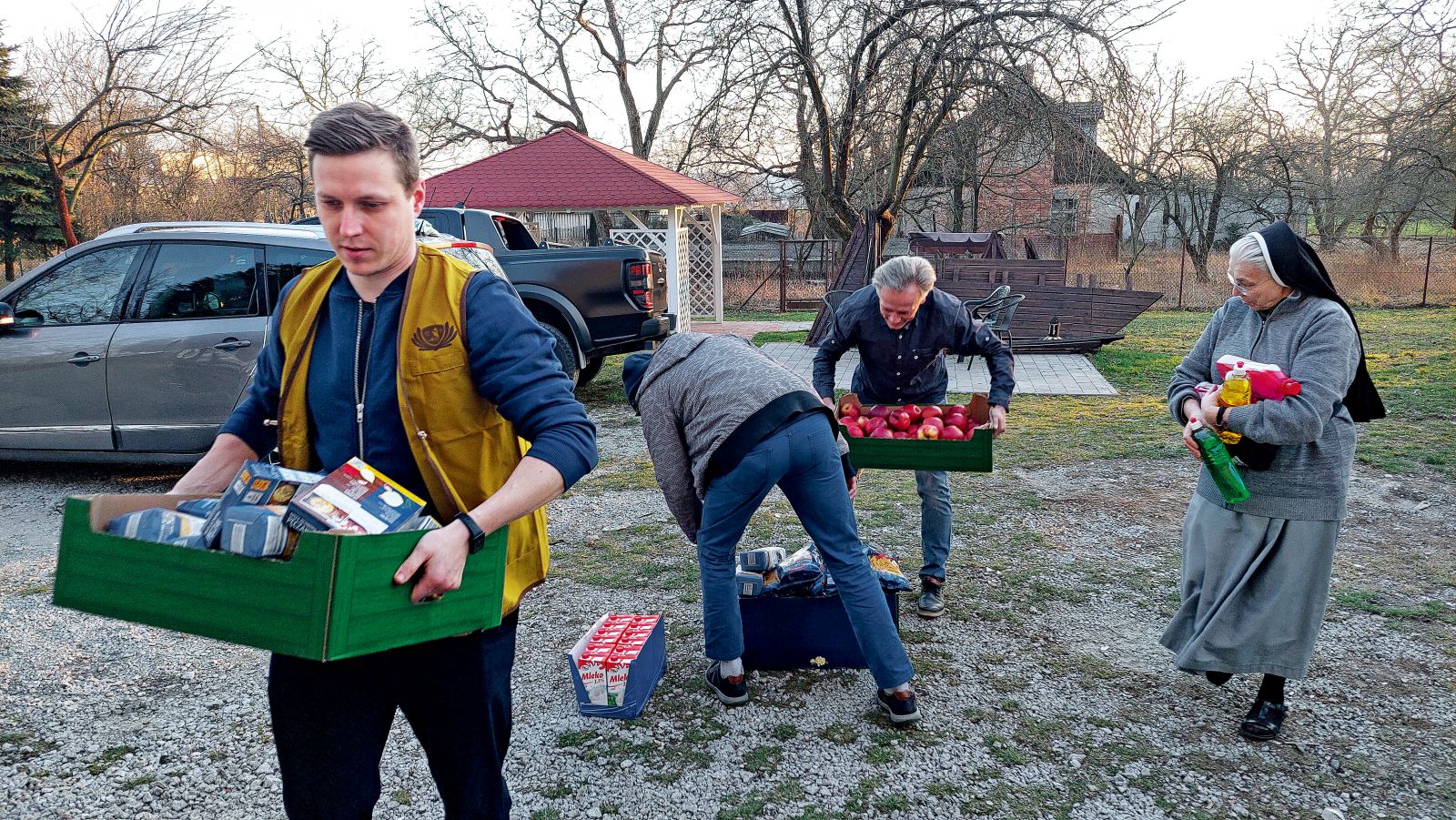
Zhang Shu-er, her husband, Łukasz Baranowski, and three other locals deliver food and other necessities to the House of Hope, a Catholic facility in Poznań, west-central Poland. The facility has taken in Ukrainian refugees and was in need of daily necessities.
Packing love from Taiwan
Many countries around the world have extended humanitarian aid to the Ukrainian people since Russia invaded Ukraine. Taiwan is no exception. Its Ministry of Foreign Affairs (MOFA), for example, started a drive in March to collect 20 kinds of goods and 14 kinds of medicine to help Ukrainian refugees. So many items poured in the Ministry asked Tzu Chi for assistance.
"We received the request for help on the afternoon of March 9," said volunteer Wu Ying-mei (吳英美). "It had been just two days since MOFA had launched their drive, but more goods than expected had been sent in." She said that the ministry hoped to draw on the strength of Tzu Chi volunteers who had had many years of international relief experiences to help them sort and pack the donated goods.
Volunteers started work on March 11 and didn't finish until March 20. Some warm-hearted members of the public and MOFA employees also pitched in to help. It was hustle and bustle every day as everyone gathered and worked in the vast basement parking lot of the MOFA building. "Refugees might catch a cold, become injured, be infected by germs, or have diarrhea while in exile," said pharmacist Su Fang-pei (蘇芳霈), a member of the Tzu Chi International Medical Association, as she conducted an inventory of donated medications and explained the function of each. "When that happens, they might need antibiotics."
The packages or boxes donated by individuals or organizations contained a variety of goods, which needed to be organized by type, inventoried, and repacked. The number of boxes volunteers packed each day ranged from more than a thousand to more than 3,000. The workload was so heavy the hands and legs of older volunteers were sore and stiff by the end of the day. Even so, they showed up again the next day to keep working. Zeng Qiu-xiang (曾秋香), for example, volunteered for three days straight. She lived a long way from the packing venue, and she had to first take a bus and then the MRT to get to the venue to work. But she was so inspired by the love of her fellow volunteers and the Taiwanese people in general that she happily reported to the MOFA building for three days in a row to contribute her strength.
"One day when I got off at the NTU Hospital MRT station to go to MOFA," Zeng said, "an expectant mother pulling a grocery cart behind her approached me and asked, 'Could you show me the way to MOFA's basement parking lot?' She said she had bought some brand-new thermal wear to donate to Ukrainian refugees. Isn't that so touching?"
Daria Zheng, a Ukrainian who married a Taiwanese, pitched in with the packing effort too. She was accompanied by a Tzu Chi volunteer friend. After the event came to an end, she personally visited Tzu Chi headquarters in Hualien to convey her thanks to Tzu Chi volunteers. "I can speak four languages," she said, "but there are no words that can allow me to adequately express my gratitude to you all!"
All told, Tzu Chi volunteers put in 2,148 shifts to help with the effort. During ten days, they, along with members of the public and MOFA employees, packed more than 20,400 boxes of goods, weighing a total of 200 tons. They helped hasten the speed the aid could reach Ukrainian refugees.
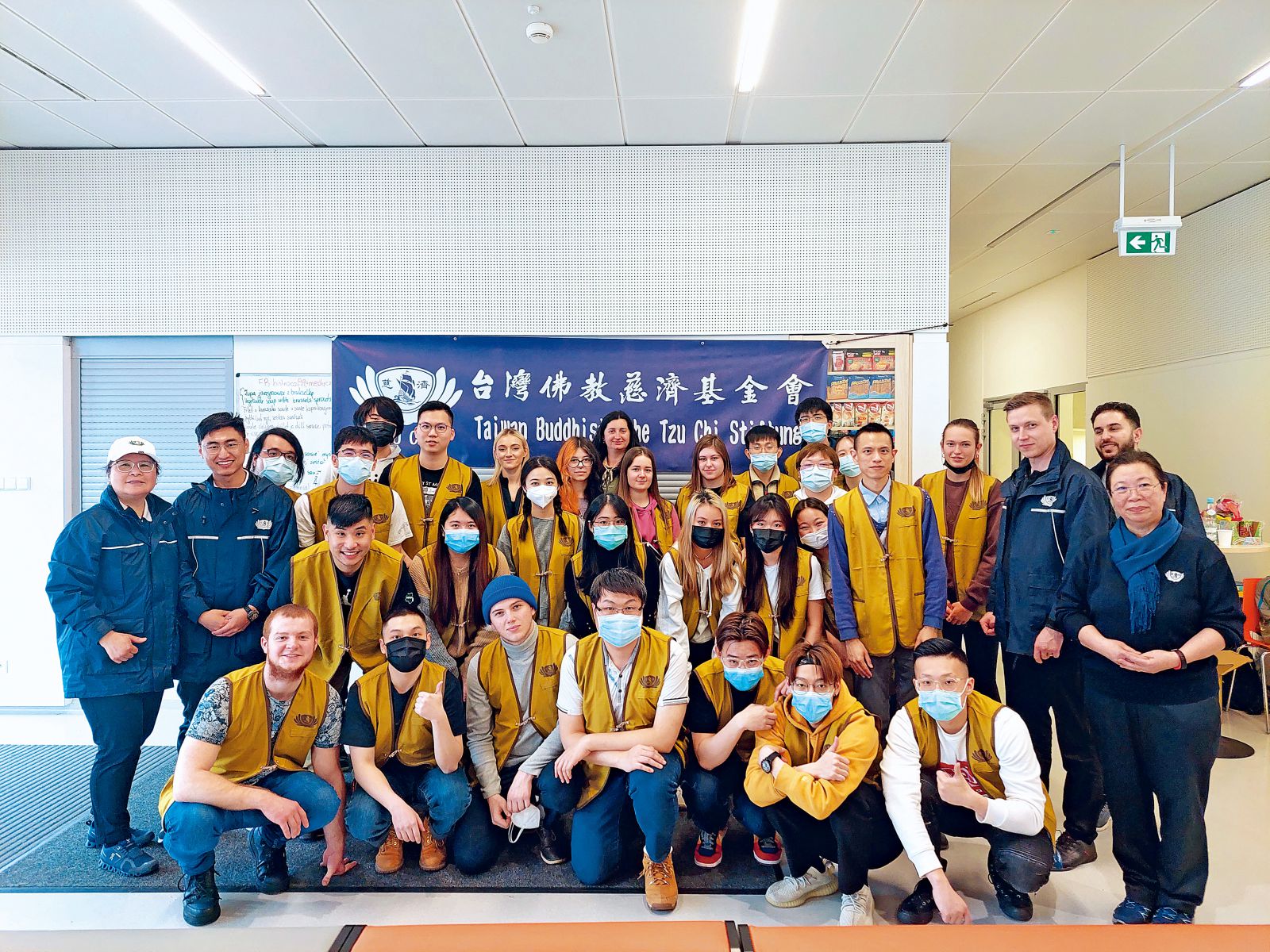
Tzu Chi volunteers from Germany and the Netherlands pose with Taiwanese and Ukrainian students and other helpers. They had just finished Tzu Chi's first distribution of shopping cards for Ukrainian refugees in Poland. Courtesy of Zhang Shu-er
The human cost of conflict
According to Simon Shyong (熊士民), deputy CEO of the Tzu Chi charity mission, Tzu Chi has signed an agreement with the United Nations Children's Fund to work with the UN agency to provide a wider range of help for Ukrainian refugees, the majority of whom are women and children.
In addition to helping displaced Ukrainians, Tzu Chi has for many years provided aid for refugees from Syria, Myanmar, and other countries. The Syrian civil war has dragged on for more than a decade. Even though there is presently no more armed conflict in most of the country, most Syrians who have fled to other countries still find it difficult to return to their homeland.
"Syria is suffering from a severe shortage of water, electricity, and petroleum," explained Chen Chiou Hwa (陳秋華), the head of Tzu Chi Jordan. "The exchange rate between the Jordanian and Syrian currencies used to be 1:60, but it's skyrocketed to 1:3500. A cylinder of liquefied petroleum gas costs ten U.S. dollars in Jordan, but ten times that amount in Syria!" Chen said that since getting by in Syria would be hard at present, most Syrians who have ended up in Jordan have decided to stay put. That being the case, make a living to sustain themselves is an issue many displaced Syrians must face.
In addition to providing local Syrian refugees with financial aid and medical care, Tzu Chi Jordan has been working with an institution that takes in Syrian refugee single mothers and orphans to offer vocational training courses to help them learn marketable skills. Such courses include nursing, cooking, sewing, hairdressing, and others.
Jordan's per capita income is not high, so it isn't easy to raise money locally for charity work. Even so, since its founding in 1997, Tzu Chi Jordan has done its best to care for local needy people, including refugees from Palestine, Iraq, and other countries. After the Syrian war broke out, volunteers expanded their care to include refugees from that country too. They have even inspired some of the refugees they have helped to join them in serving other underserved people in the country, such as the Bedouins.
Turkey is another country hosting many Syrian refugees—3.7 million of them. Tzu Chi volunteers in that country, like their counterparts in Jordan, have been doing their best to serve the needs of local Syrian refugees. At present, Tzu Chi Turkey provides regular aid to more than 7,650 Syrian families. During the COVID-19 pandemic, volunteers changed the frequency of their distribution for these families from once a month to once every two months to reduce the number of times people had to gather. Because of the large number of families Tzu Chi serves, 40 distributions are held each time. Tzu Chi Turkey has also established a school for Syrian refugee children.
Since the Russia-Ukraine war erupted, some Ukrainians have fled to Turkey. Some Syrian refugees in Turkey who have joined Tzu Chi as volunteers have sought out newly arrived Ukrainian refugees to offer emergency aid to them. Since these Syrian volunteers are refugees themselves, they are better able than most other people to empathize with the Ukrainians and give them help they need.
In a world in which war and conflict seem to have no end, humanity as a whole has to together face the refugee issue. Tzu Chi will continue to do its part to help ease the plight of refugees and make their bumpy road a little smoother.
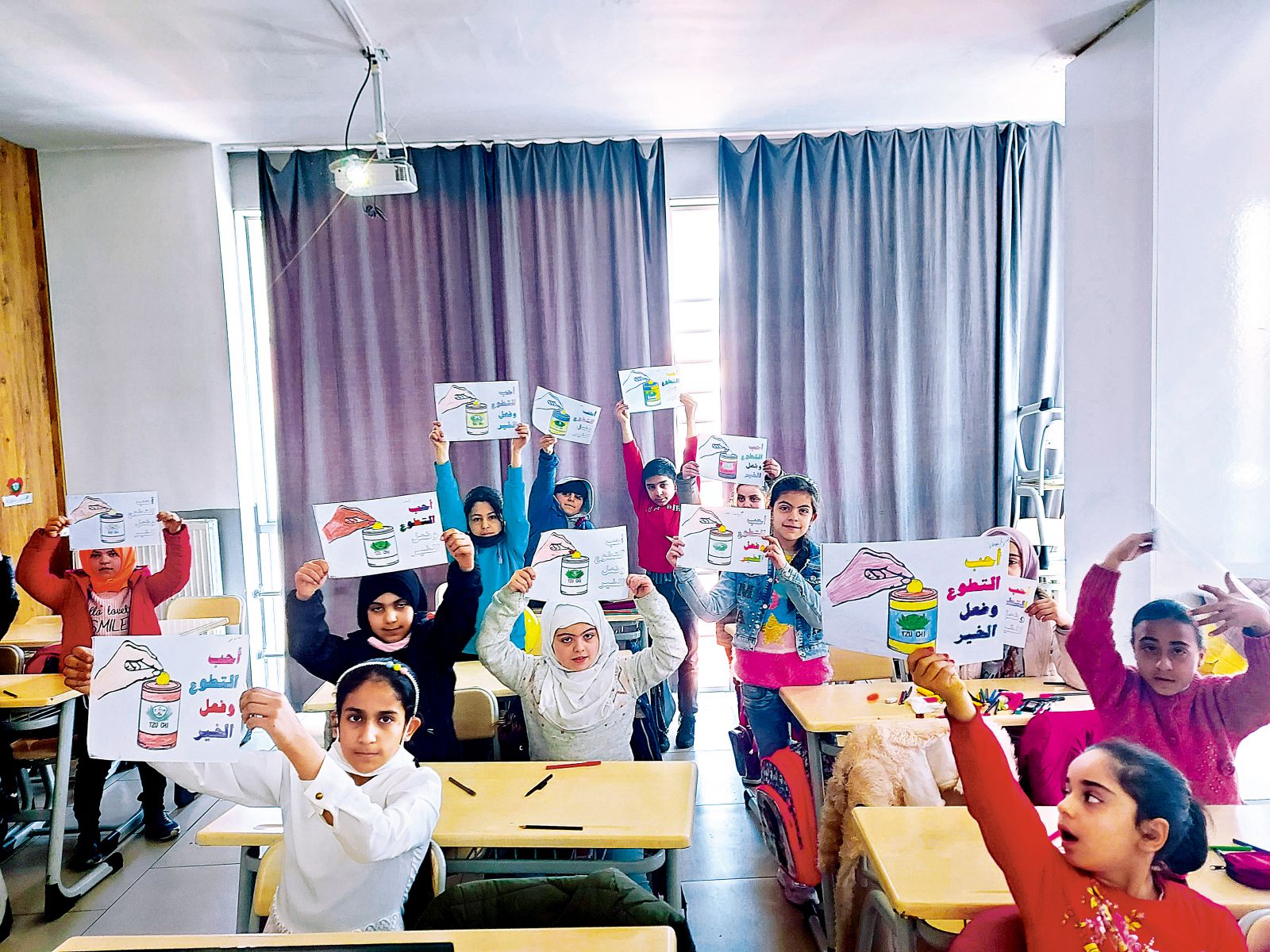
El Menahil International School was established in Turkey by Tzu Chi for Syrian refugee children. Teachers and students at the school have donated money many times to support Tzu Chi's international relief work. This March, they again started a fundraiser to help Ukrainian refugees. Abdoulmalek Wais
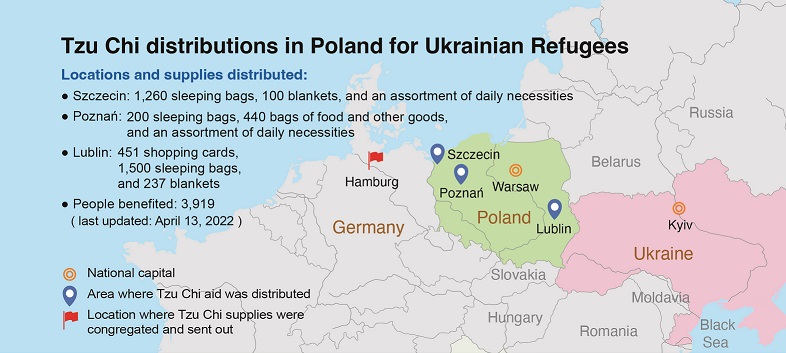
Contact Us | Plan a Visit | Donate
8 Lide Road, Beitou 11259, Taipei, Taiwan
886-2-2898-9999
005741@daaitv.com
©Tzu Chi Culture and Communication Foundation
All rights reserved.
